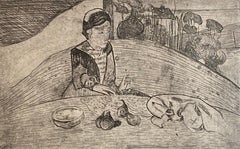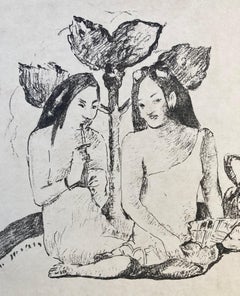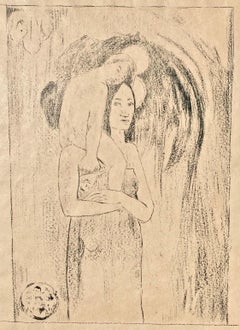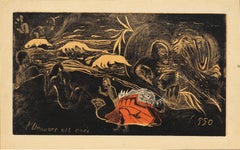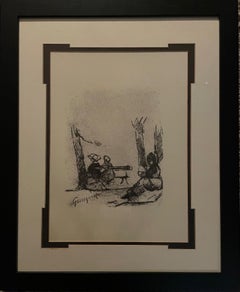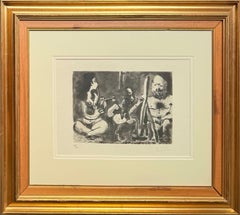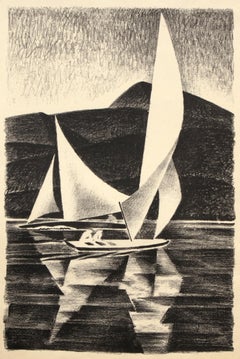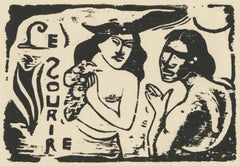Paul Gauguin Figurative Prints
Paul Gauguin revolutionized the art world by transcending the naturalism that dominated 19th-century art, opting for an emotive use of color, form and symbolism. As a leading Post-Impressionist, most of his works now reside in esteemed museums worldwide, making every market appearance a rarity.
Though inspired by the principles of Impressionist visionaries such as Cézanne, Monet, Pissarro and Degas, Gauguin was never one to follow the status quo. Paysage montagneux, for example, is a landscape that exemplifies his groundbreaking technique and is a tribute to his enduring genius. This unique composition is a testament to Gauguin's expertise in color harmonies and painterly brushstrokes, all employed with the artist's signature innovations.
Painted in Pontoise in the summer of 1882, Paysage montagneux, or Mountain Pathway, captures a secluded mountain trail framed by vibrant foliage. Rather than capturing the sky naturalistically lit by sunset hues, Gauguin paints billowing green and blue clouds, contrasting greatly with vivid flora that appears to be lit by a warm waning afternoon sun. Departing from precision to better represent a distinctive sensory experience, this captivating composition turns the conventional landscape painting on its head.
Originally a successful stockbroker and an early aficionado of Impressionist works, Gauguin entered the art world through his association with Camille Pissarro. Blessed with a unique sense of color and zest for life, he originally painted only as a hobby and transformed this pastime into his life’s work in 1882, when the Paris stock market crash cost him his job.
Although he had no formal artistic education, Gauguin was invited to exhibit in the Impressionist exhibitions of 1880, 1881 and 1882. Over time, his innate talent led him to develop an avant-garde style marked by abstract shapes and a compressed sense of space. Gauguin's pioneering sensibilities had a lasting impact, inspiring a new generation of artists to adopt his unique blend of passion, energy and compositional balance.
Gauguin’s works are currently held in the world’s most celebrated museums and private collections. Similar, though less vibrant, landscape compositions are held in the permanent collections of the Louvre, the Museo Nacional Thyssen-Bornemisza, the Metropolitan Museum of Art and the National Gallery of Art in Washington, D.C.
Find original Paul Gauguin art for sale on 1stDibs.
(Biography provided by M.S. Rau)
1970s Academic Paul Gauguin Figurative Prints
Archival Paper, Etching
1890s French School Paul Gauguin Figurative Prints
Lithograph
1890s Modern Paul Gauguin Figurative Prints
Lithograph
Late 19th Century Post-Impressionist Paul Gauguin Figurative Prints
Etching
1890s Paul Gauguin Figurative Prints
Woodcut
Late 19th Century Paul Gauguin Figurative Prints
Lithograph
1890s Paul Gauguin Figurative Prints
Woodcut
1890s Modern Paul Gauguin Figurative Prints
Woodcut
Late 19th Century Paul Gauguin Figurative Prints
Black and White
1890s Paul Gauguin Figurative Prints
Woodcut
20th Century Modern Paul Gauguin Figurative Prints
Etching
1930s American Modern Paul Gauguin Figurative Prints
Lithograph
20th Century Paul Gauguin Figurative Prints
Lithograph
1910s Academic Paul Gauguin Figurative Prints
Pencil, Etching
1990s Post-Impressionist Paul Gauguin Figurative Prints
Lithograph
1960s French School Paul Gauguin Figurative Prints
Lithograph
Early 2000s Academic Paul Gauguin Figurative Prints
Lithograph
1980s American Modern Paul Gauguin Figurative Prints
Lithograph
1930s American Modern Paul Gauguin Figurative Prints
Lithograph
1970s French School Paul Gauguin Figurative Prints
Lithograph
1980s Pop Art Paul Gauguin Figurative Prints
Woodcut
1970s French School Paul Gauguin Figurative Prints
Lithograph
Early 1900s French School Paul Gauguin Figurative Prints
Woodcut
Early 1900s Paul Gauguin Figurative Prints
Monotype
1890s Post-Impressionist Paul Gauguin Figurative Prints
Woodcut
